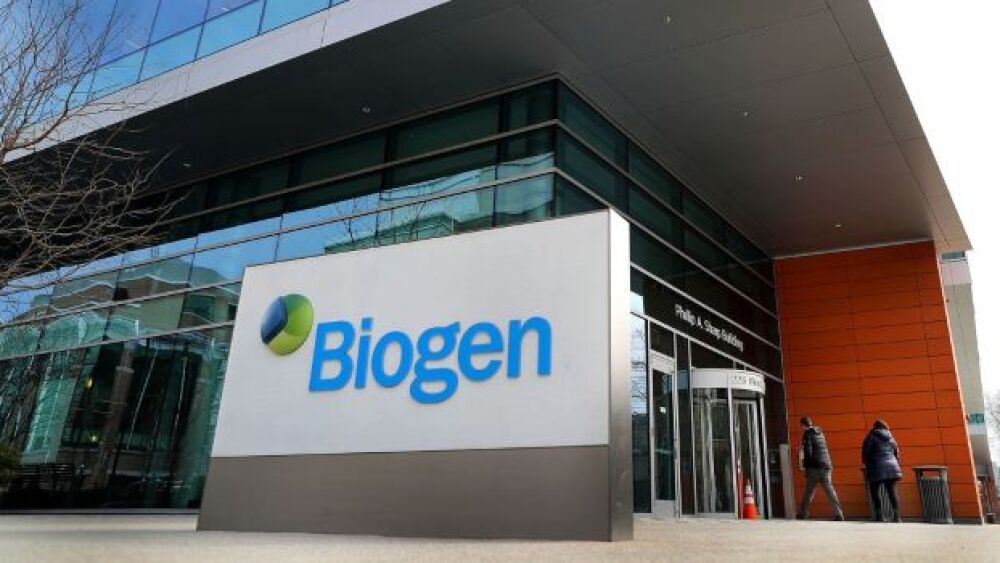Biogen may have found its CEO in Mathai Mammen - former head of research and development in pharmaceuticals at Johnson & Johnson.
Courtesy of John Tlumacki/The Boston Globe via Getty Images
Biogen may have found its CEO in Mathai Mammen - former head of research and development in pharmaceuticals at Johnson & Johnson - following the pending departure of current company head Michel Vounatsos.
Mathai Mammen, who left his role at J&J in August, could be in the running for the Biogen position. First reported by STAT News, Mammen’s hiring would be a change of pace for Biogen, as the company has primarily tapped CEOs versed in corporate leadership instead of working scientists.
Citing unnamed individuals close to the matter, STAT reported that Mammen and Biogen have been engaged in conversations, but at this time, no formal offer has been made.
Mammen declined BioSpace‘s request to comment on the matter.
A Biogen spokesperson told BioSpace that the search for a new CEO remains ongoing. As that continues, the spokesperson said Vounatsos and the leadership team are “focused on delivering on the company’s mission and business priorities.”
Vounatsos has served as CEO of Biogen since 2017. After the tumultuous rollout of Alzheimer’s disease therapeutic Aduhelm, the Boston-based company began its search for a new CEO earlier this year. The company announced Vounatsos will depart Biogen when a new CEO is settled into the position.
Only weeks before the announcement of Vounatsos’ departure, the U.S. Centers for Medicare and Medicaid voted to limit coverage of Aduhelm to patients who are participating in clinical trials. The company also pulled its Marketing Authorization Application for potential European approval of the drug.
During this same time frame, it was revealed that Vounatsos’ bonus was cut in half to hold him accountable for the overall business performance of 2021.
At the same time that Vounatsos’ departure was announced, Biogen also announced substantial cuts to its commercial infrastructure supporting Aduhelm. The company intended to maintain minimal resources in order to manage patient access for the program.
Who is Mathai Mammen?
During Mammen’s time at J&J, he played significant roles in the development of multiple medications, including its esketamine-based treatment for major depression disorder, Spravato. In addition to Spravato, which was approved by the FDA in 2019, Mammen also had a hand in the development of J&J’s COVID-19 vaccine.
In addition to drug development, Mammen also took part in guiding the company’s M&A activity. He helped lead the acquisition of Momenta Pharmaceuticals and its lead asset, nipocalimab, an aglycosylated, effectorless IgG1 anti-FcRn monoclonal antibody.
Mammen also guided the partnership with China’s Legend Biotech that led to the development of Carvykti, a CAR-T therapy greenlit by the FDA this year as a treatment for multiple myeloma.
Before J&J, Mammen co-founded Bay Area-based Theravance Biopharma, where he served as head of R&D before departing in 2016 for a brief stint at Merck. At Merck, Mammen oversaw research in the areas of cardiovascular disease, metabolic disease, immunology, oncology and immuno-oncology. He remained at Merck for about 15 months before departing for J&J.
If Mammen is tapped as Biogen’s new CEO, he will step into a company still focused on developing potential therapies for Alzheimer’s.
In September, Biogen’s developmental partner Eisai announced promising data from its lecanemab program in Alzheimer’s. The anti-amyloid beta protofibril antibody slowed disease progression in a Phase III Alzheimer’s study. Complete data from this study will be presented Nov. 29 at the Clinical Trials on Alzheimer’s Congress.
In addition to advancement in Alzheimer’s, Biogen also made significant advancements in a therapeutic for a rare form of amyotrophic lateral sclerosis. In September, Biogen revealed its experimental drug tofersen slowed the decline of the disease by lowering SOD1 protein and neurofilament levels. SOD1-ALS, caused by mutations in the SOD1 gene, affects approximately 2% of all ALS patients globally.





